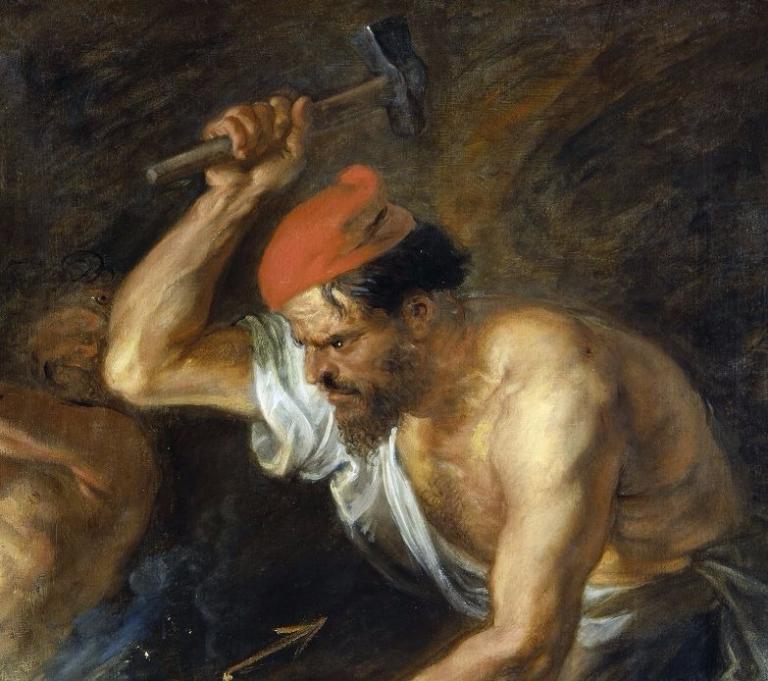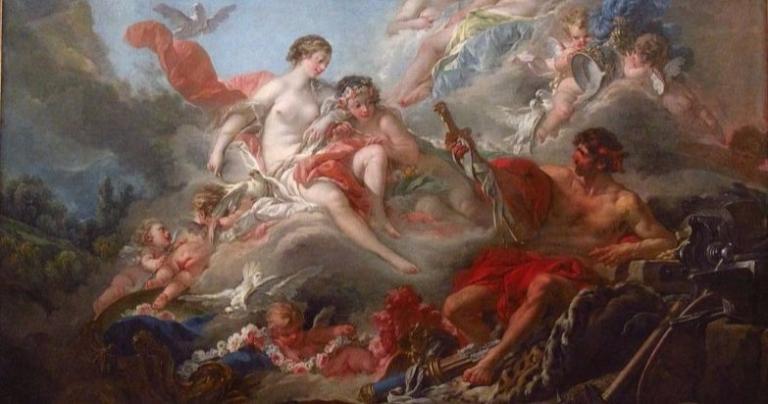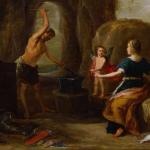“September, beginning in the sign of Libra, celebration of the Autumn Equinox and honors to the heroes of the battle of Marathon. During this month God Hephaistos dominates and the virtues of Creativity (Ευμηχανία- Evmichanía) and Diligence (Φιλοπονία – Philoponia) are cultivated.” (Translated from Greek, Y.S.E.E Theology & Practice)
In September, the Supreme Council of the Ethnic Hellenes commemorates the battle of Marathon of 490 B.C.E during the first Persian invasion of Greece. The Greeks confronted the Persian army of King Darius, defeating them with fewer soldiers compared to the larger Persian force. The victory would be regarded as one of the greatest moments in Greek history at that time. For those who fought in the battle and lived, it was regarded as their greatest accomplishment. On the gravestone of Aeschylus, the father of tragedy, it made no reference to his literary accomplishments, instead what was important for him was to memorialize his participation in the battle of Marathon.

Beneath this stone lies Aeschylus, son of Euphorion, the Athenian,
who perished in the wheat-bearing land of Gela;
of his noble prowess the grove of Marathon can speak, and the long-haired Persian knows it well.
-Inscription on Aeschylus’s gravestone
Focusing on spiritual observance, September is ruled by the god Hephaistos. In honor of Hephaistos, we recite and reflect on his Hymn:
Sing, clear-voiced Muse, of Hephaistos famed for inventions. With bright-eyed Athena, he taught men glorious crafts throughout the world, —men who before used to dwell in caves in the mountains like wild beasts. But now that they have learned crafts through Hephaistos the famed worker, easily they live a peaceful life in their own houses the whole year round. Be gracious, Hephaistos, and grant me success and prosperity!
During this month, the virtues of Creativity (Ευμηχανία- Evmichanía) and Diligence (Φιλοπονία- Philoponía) are cultivated. I want to start with “Philoponía”, which means love for labor and activity. Opposite to it is “Fyponia”, that is, avoidance of labor, laziness, sluggishness, inactivity. As a virtue, Philoponia is defined as a permanent labor, which, through the diligence, zeal and stability of the subject, seeks to achieve high goals without material interest (laboring for intrinsic value).
Philoponía was one of the four virtues which shaped teenagers into social and political members of the polis. Philoponía strengthens self-respect, as well as respect for the labor of fellow people. What is understood is that whoever offers nothing but, worse yet, does not respect the efforts of others, is a parasitic being that is nourished by the energy of others or exploits the effort of others.
Evmichanía produces intelligence and inventiveness. Evmichanía guides us in perfecting our work, while avoiding perfectionism. Focusing on the important and the feasible is the path of Evmichanía. Perfectionism is a pursuit of the impossible. Evmichanía takes us duality, and opens us to other options, alternatives to what we think are the only possible ways doing or achieve something. Evmichanía reveals to us your success is not “this or that” but “this, that, or the other”.
Understanding these virtues, we can apply them to our lives by being aware of our efforts and intentions in our creative endeavors. Hephaistos is an inventor, a craftsman. For this month, to honor Hephaestus, focus on your skills, crafts, hobbies and or any creative projects you wish to initiate. It is also important to be aware of your role in society, at work, in your family and or in personal relationships. Ask yourself, “What do I provide?” “Do I take more than I give?” or “Do I give more than I take?”
Evmichanía and Philoponia go together in that Philoponia aids and complements Evmichanía. Our diligence and attention contributes to creativity and production. As a tarot reader, I cannot help but to make a connection between these virtues and the 8 of Pentacles. The 8 of Pentacles, the Lord of Prudence is a card of diligence in our craft/productive efforts. Prudence, in the Greek root, relates to practical knowledge. This practical knowledge relates back to Evmichanía’s guidance in doing what is feasible.
Being diligent to activate our creativity requires us to keep our mind focused in the present and demands that we be patient and attentive to our tasks, projects, and general work overall. Ultimately, practicing these virtues cultivates the happiness and satisfaction that comes from being a creator, a maker. Practicing the virtues of Hephaistos can be as mundane as completing tasks in an orderly fashion, and getting things done. Hephaistos calls upon us to contribute to contribute to the community for the benefit of others along with ourselves, and not for ourselves alone.
Reflecting on his myth, Hephaistos is crippled from birth. Hesiod tells us his mother, Hera, tossed him from Olympus at the sight of his deformity. Another myth has Zeus tossing him off Olympus. In this version, the fall is what cripples him. Why is he crippled? I ask this, not in the literal sense, that he is literally crippled. But why did the Greeks think of this God as crippled? His malformation may be a literal representation of the risks associated with the occupation. The God thus represents a spectrum of the occupation. The ability to create wonderful things, but also the risk of injury. Eros’ arrows and the armor that Achilles wore in the Trojan war are two examples of his creative powers.

Hephaistos is married to Aphrodite, this tells us that what Hephaistos produces is beauty/beautiful and he labors for the love of the work and end result. It reveals to us that Love is a fundamental force of creation. Greek philosophy teaches us that it is Eros (love) which brings the elements together. Eros is the son of Aphrodite and not Hephaistos. However, through association, these three are connected. There exists a relationship between artisanship/artistry and beauty/love.
Finishing my reflection on Hephaistos, I admire Hephaistos because despite being lamed, he still is powerful and able to produce and create. Hephaistos shows us mortals that despite our own disabilities or limitations, whatever they may be, it does not separate us from the divine in any way. We have the capacity to do great things if we practice the virtues Philoponía and Evmichanía.
Repeat after me:
Be gracious, Hēphaistos, and grant me success and prosperity!
This is a first of a series which are dedicated to the festivals of the official calendar of the Hellenic Religion as observed by the Supreme Council of the Ethnic Hellenes. Each month there is a festival, a god which dominates the month, and virtues which are cultivated in honor of the deity.
Sources on the virtues are attributed to the following:
Vlassis G. Rassia,Areti, The Value System of the Greeks”, vol. 2, “Open City”, Athens 2016, ISBN 978-960-7748-53-9













